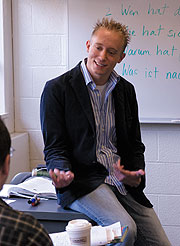  |
| HOME | THIS ISSUE | CALENDAR | GRANTS | BACK ISSUES | < BACK | NEXT > |
Accelerated language class helps students learn German quicklyby Sherry Fisher - November 5, 2007 | ||||
| A handful of students sit in a semicircle in a classroom in the Arjona building, discussing a short story. Occasionally they ask their instructor a question, but mostly they’re talking to each other. And everyone is speaking German. English isn’t allowed in this course, Intensive Intermediate German, which combines two semesters of the language for a total of eight credits. It benefits students who need to finish a language requirement, are working on a dual degree or double major, or plan to participate in a Study Abroad experience. The class meets for eight hours each week: Monday and Wednesday for three hours and two hours on Friday. A similar course at the elementary level was offered last semester. Both courses are taught by graduate student Alfred Schler, a native of Austria. The class was such a success last semester that Schler was asked to teach the intermediate course, according to Friedemann Weidauer, chair of the German program. “The students are very motivated,” says Schler. “They are all hard-working. Some of them told me that they couldn’t even imagine taking a regular class next semester. They said it would be weird for them to only have German for four hours a week.” Jade Baldwin, a junior majoring in English, says she “couldn’t imagine doing this any slower. If you’re going to learn a language, this is the way to do it.” She says Schler is an “amazing teacher. In the elementary class, we went from knowing no words of German at all to being able to have conversations with the entire class without ever breaking into English.” “I took five years of Spanish in high school and retained almost none of it,” says Baldwin. “In high school, you would learn 10 vocabulary words at once – and then never use them again. Now, we learn vocabulary by using it. I’m a huge fan.” Schler says one of his main goals is to keep the students talking. “They get input from me, but I don’t want to be the only one speaking German,” he says. “I don’t want to be the center of the classroom. If they go to Germany or Austria at some point, I want them to be able to speak.” There are seven students in the class. The small size is conducive to a lot of interaction, Schler says: “It’s like being a family.” Greg Hyman, a senior majoring in English, says taking the intensive German courses has been “great. I love it. I feel it takes you an hour in class to where you’re actually thinking in German. Sometimes after I leave German class on Mondays and Wednesdays, I find myself thinking in German.
“You can get a lot of language in a very short amount of time,” he adds. “It makes it much easier to learn a language when you’re immersed in it. The more time you can spend speaking it, the more fluent you become.” Hyman also enjoys the small class size. “It’s phenomenal. You get a lot of time to speak and interact with your classmates.” Baldwin says she likes writing one-page compositions on a subject. “We’re on our fourth one,” she says, noting that it has been helpful for improving her grasp of grammar and sentence structure. Amanda Pickett, a third semester German major, says language immersion is the best way to learn and retain it. “I took this course because I liked the course at the elementary level,” she says. “I really enjoy learning German, and feel that learning a language is something that must be studied intensively, otherwise concepts and vocabulary aren’t retained.” She says she enjoys the exchanges with her classmates. “We once carried on a group discussion pertaining to our favorite trips,” she says. “It went on for the entire first half of class. When Alfred declared the mid-class break, we responded with something like, ‘What? It’s been that much time already?’ The students were so wrapped up in conversation. During another class, Pickett says, we “set up what became a heated and hilarious debate about ‘lazy, ungrateful, young people, and ‘strict, uncompromising adults.’” Manuela Wagner, assistant professor of foreign language education, says the intensive courses are “very challenging and rewarding.” She says the intensity of the courses almost “simulates the exposure of being in the country.” Katharina von Hammerstein, professor of modern and classical languages, says providing intensive courses in German during the academic year is the next best thing to sending students to study abroad in German-speaking countries or offering summer immersion programs. |
| ADVANCE HOME UCONN HOME |

